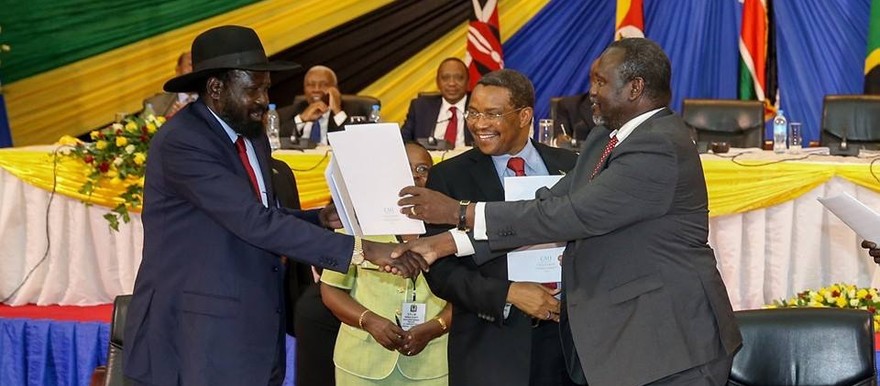The agreement signed by three SPLM factions in Arusha, Tanzania on Wednesday contains general provisions on how to reunite the party but “no details” and will not result in immediate unification of the opposing groups, according to one of the negotiators involved in the talks.
Salva Kiir of the SPLM-Juba, Riek Machar of the SPLM-In Opposition, and Deng Alor Kuol of the SPLM-G10 faction signed a “reunification” agreement under the aegis of the majority Chama Cha Mapinduzi party of Tanzania. The agreement comes after two rounds of “intra-party dialogue” overseen by the Tanzanian party.
Mabior Garang, spokesman of the SPLM-IO group, called the political agreement a step in the right direction that will help the formal IGAD-led peace process hosted in Ethiopia.
Speaking to Radio Tamazuj yesterday he explained, “In Arusha we made something called a framework agreement for the unity of SPLM. The Arusha process will help the Addis Ababa process to move forward more quickly. The Addis Ababa process when it is finished will likewise help the Arusha process.”
“This is not a comprehensive agreement, it is 20% of an agreement. So it’s a good sign because for a long time, since December 2013, there has not been any time when we have been so close to peace,” said Mabior.
He described it as an agreement about “reforms,” saying that it addressed issues such as the need for a new party constitution.
Asked whether the ‘unification’ meant the SPLM-IO and SPLM-G10 factions would now return under the leadership of Salva Kiir he said, “It’s not like that. Salva will be the chairman for the time being because there is no mechanism that can take him out now. To remove him is not out of the question — we are still negotiating and this is only 20% of an agreement.”
Mabior noted, “We are still moving forward with dialogue with the government. There will be an Arusha 3 at which there will be committees that will work on the details, because there are no details in this agreement. It is general provisions. We have a lot of hope that there can be an agreement at the end of the day but we are still far from a comprehensive peace.”
Another SPLM-IO representative, James Gatdet Dak, said that the agreement helps address a “failure to institutionize” in the party. In written remarks, he pointed to some details such as a provision allowing the use of secret ballot in party leadership deliberations.
However, the text of the agreement itself is ambiguous as to whether the signatories have actually committed to a secret ballot or rather simply committed to consider the issue at a National Liberation Council meeting, which would theoretically be convened after reunificationn.
The agreement also contains a provision on term limits for SPLM National and State chairpersons, limiting them to two terms of 5 years each, without specifying when this would take effect — whether it would apply from now or from when a chairman first took office, or from some other point in time, for instance from the date of the next state and national conventions. In its 32 year history, SPLM has only held two national conventions, once at Chukudum and once at Juba.




